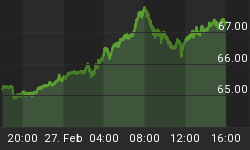U.S. demand for gas at the pump is starting to react to the rising prices. No wonder. U.S. consumers are seeing a 30% jump in oil prices over the past few months. U.S. motor fuel prices have become a heated political issue after pushing towards $4 a gallon. Gasoline futures hit 33-month highs on Tuesday. The rising prices at the pump are fueling voter discontent with Obama's leadership and could harm his re-election chances in 2012. Government is saying it is due to speculation. But Saudi Arabia has cut production by 600,000 barrels a day. Is Saudi Arabia to blame? Why would oil producers cut production like this when the oil price is so high? We have to ask ourselves, "Is that all there is to this story or is there something out there that justifies cuts in production and accepts higher oil prices?" There is and this article will highlight that.
Look across to the Eurozone and see what has happened to the oil price in terms of the euro. When the dollar was at $1.23 against the euro the oil price stood at approximately$80 to $90 for a barrel of oil. This meant that in the euro a barrel of oil cost €65.04 - €73.17. Now the dollar is at $1.48 and the oil price is at $112 for West Texas crude and $123 for Brent crude. This, in the euro is now €75.68 and €83.11. So Europeans have not seen much of a rise in the oil price. Worldwide, where the dollar has fallen against other currencies the same is also true. In China, where the Yuan is still held tight to the dollar, oil prices have risen in line with the fall in the Yuan against other currencies.
Now, look at it from oil producers' standpoint. The United States and China comprise less than half of global demand [China at 10 million barrels a day]. Oil producers believe that they should maximize their income from oil because they owe it to themselves and subsequent generations. After all, it is irreplaceable. They do accept that they should not charge so much as to cause growth to fail and oil demand to drop. They have, therefore, to balance these considerations with the objective of maximizing oil income over the long-term.
With China's robust growth, an anemic (but still growing) U.S. economy and the rest of the world not experiencing oil price increases, producers have concluded that they do not need to lower oil prices.
The general financial world's perception is that the United States is unconcerned by the dollar's exchange rate and will do nothing to strengthen it. Actions by U.S. monetary authorities confirm that. Clearly this is what Saudi Arabia and other oil producers believe too. So, when the prospects of prices falling in the euro arise, we do expect oil producers to cut supply to ensure that the euro price of oil remains stable.
Impact on global growth
In line with the above, then, we do not expect Eurozone or strong nation's growth to be negatively impacted by the current level of oil prices. The economic growth prospects of the strong Eurozone economies such as Germany's will not be affected.
Chinese and U.S. growth will be affected because of their falling exchange rates.
The U.S. will be affected more so because higher energy prices are dampening growth at consumer levels. The U.S. needs the consumer to spend before it can see a real recovery. With housing prices continuing to fall, food and energy prices rising, and flat wages, a "stagflationary" environment is being created. If this does not change soon, the possibility of another recession rears its ugly head yet again.
In China, the rise in food and energy prices is being combated by government action, but not quickly enough to prevent many newly middle class from slipping back to poverty levels again. This could be socially dangerous for the government there. [In the upcoming auction of Iraqi oil fields, we expect to see China go in and pay top dollar to ensure that this supply heads east.]
The only way for the two major global nations to lower oil prices is therefore to force their exchange rates up against other stronger currencies. Unfortunately, we do not expect that to happen for other reasons.
It is very clear to all that Chinese growth needs to continue to assist growth in the other parts of the world to avoid recession or depression. On balance, therefore, we believe that global oil producers are attempting to balance their rapacity for income with their caution in avoiding reducing supply. This is a delicate operation that could quickly earn them the anger of the world. In the Middle East today, every government realizes how tenuous his hold on power is and will be ultra cautious to temper greed with fear.
Impact on precious metal prices
Subscribers only- Subscribe through www.GoldForecaster.com and www.SilverForecaster.com















